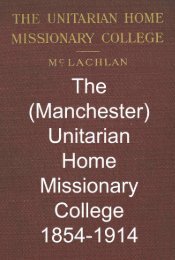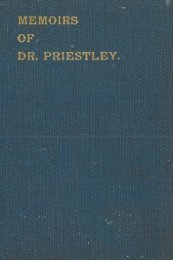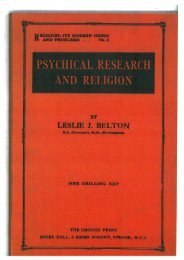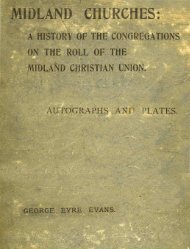Essays in Unitarian Theology by Kenneth Twinn Lindsey - General ...
Essays in Unitarian Theology by Kenneth Twinn Lindsey - General ...
Essays in Unitarian Theology by Kenneth Twinn Lindsey - General ...
Create successful ePaper yourself
Turn your PDF publications into a flip-book with our unique Google optimized e-Paper software.
IMAGES OF GOD<br />
<strong>by</strong> Leonard Mason<br />
DURING the development of religious thought many<br />
concepts, expressed either as visual imagery or as<br />
verbal symbols, have arisen to give focus and body to<br />
man's <strong>in</strong>timation of the supreme reality he calls God.<br />
For Christian devotion the expression " Our Father<br />
<strong>in</strong> Heaven " has rema<strong>in</strong>ed central partly because it<br />
was the imagery used <strong>by</strong> Jesus himself, partly because<br />
the very hieratic transmission of the symbol <strong>by</strong> the<br />
church through twenty centuries gives it added devotional<br />
effect, and partly because it is a symbolism open<br />
to all. With<strong>in</strong> the family circle a human father represents<br />
both the providential and the restrictive factors<br />
<strong>in</strong> life, and these characteristics are directly attributed<br />
to God, Father of all. <strong>Unitarian</strong>s have <strong>in</strong>herited this<br />
Christian symbol and have attached special value to<br />
it because it seems most theologically apt to express<br />
their non-tr<strong>in</strong>itarian po<strong>in</strong>t of view. They hold that<br />
there is One Father of all, whose personality is not<br />
enhanced <strong>by</strong> be<strong>in</strong>g divided <strong>in</strong>to several aspects.<br />
But imagery fades, symbols become worn smooth<br />
<strong>by</strong> constant use, and expressions fail to hold the emotional<br />
and <strong>in</strong>tellectual content they once had. We<br />
need to enquire whether the symbolic concept of<br />
Div<strong>in</strong>e Fatherhood is still adequate to evoke a deep and<br />
<strong>in</strong>telligent response <strong>in</strong> contemporary man. Obviously<br />
42<br />
IMAGES OF GOD 43<br />
the symbol, even <strong>in</strong> traditional language, has not stood<br />
*n<strong>in</strong>terpreted, for God is not Father <strong>in</strong> the same sense<br />
and to the same degree that man is father. He is<br />
quantitatively greater, be<strong>in</strong>g the ultimate parent of<br />
two or three thousand million liv<strong>in</strong>g childten <strong>in</strong>stead<br />
of the two or three average <strong>in</strong> Western families; he is<br />
also <strong>in</strong> an extended sense Father of myriads of other<br />
liv<strong>in</strong>g creatures who are dependent on his creative,<br />
P rovident and susta<strong>in</strong><strong>in</strong>g power. He is also qualitatively<br />
more perfect than man. He embbdies the<br />
P erfection of each father-like characteris tic. Man<br />
P rocreates <strong>by</strong> biological means, God <strong>by</strong> a putt<strong>in</strong>g forth<br />
of spiritual grace; man provides for his offspr<strong>in</strong>g <strong>by</strong><br />
limited power and resource, God puts the available<br />
resources of the whole universe at the disposal of his<br />
creatures ; man <strong>in</strong>structs and discipl<strong>in</strong>es his children<br />
<strong>by</strong> the light of his own experience and <strong>in</strong>herited cus-<br />
toms, God <strong>in</strong>structs <strong>by</strong> the very grandeur of natural<br />
processes and <strong>by</strong> the sweep of history itself; man guides<br />
<strong>by</strong> his example of good manners and moral behaviour,<br />
God guides, <strong>in</strong> Christianity at any rate, <strong>by</strong> giv<strong>in</strong>g of<br />
himself <strong>in</strong> sacrifice for the whole of unregenerate man-<br />
k<strong>in</strong>d; man forgives his own children their immature<br />
faults, God offers forgiveness unto eternal life to all<br />
who are truly repentant. Man is partial, God is<br />
universal. Summ<strong>in</strong>g these characteristics of good<br />
fatherhood and carry<strong>in</strong>g each of them to the limit of<br />
perfection, we arrive conceptually at the Div<strong>in</strong>e<br />
Fatherhood. Obviously no man exemplifies all of<br />
these qualities, nor any s<strong>in</strong>gle one of them to perfec-<br />
tion, but the symbol " Father ", with its emotional<br />
overtones, can evoke both the sum and the perfection<br />
of Fatherhood, and that men call God.






